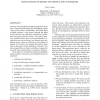2594 search results - page 55 / 519 » Elements of a Theory of Simulation |
WSC
1997
13 years 10 months ago
1997
Discrete-event simulation models typically have stochastic components that mimic the probabilistic nature of the system under consideration. Successful input modeling requires a c...
PADS
2004
ACM
14 years 2 months ago
2004
ACM
This paper advocates the use of a formal framework for analyzing simulation performance. Simulation performance is characterized based on the three simulation development process ...
ECAI
2006
Springer
14 years 11 days ago
2006
Springer
Abstract. Computational Game Theory is a way to study and evaluate behaviors using game theory models, via agent-based computer simulations. One of the most known example of this a...
HICSS
2007
IEEE
14 years 3 months ago
2007
IEEE
On December 26, 2004, countries in the Indian Ocean basin were struck by a tsunami generated by a large magnitude earthquake just south of the western tip of Sumatra. Observations...
COMPGEOM
2005
ACM
13 years 10 months ago
2005
ACM
Star splaying is a general-dimensional algorithm that takes as input a triangulation or an approximation of a convex hull, and produces the Delaunay triangulation, weighted Delaun...

